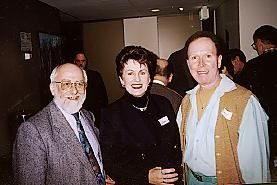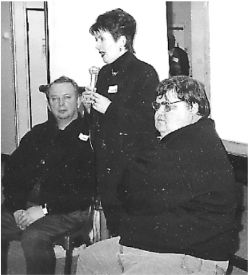Significant Personal Relationships Bill
By: Clover Moore, Larry Galbraith and Gerard Gooden (Sep 19 2022)Clover Moore’s Significant Personal Relationships Bill
A discussion by Clover Moore, Larry Galbraith and Gerard Gooden
 It was particularly gratifying to hear, for once, an Australian politician putting forward a sensible and practical solution to a vitally important problem besetting the queer community. This was even more welcome in the current political climate in which every neo-fascist organisation from Dumb Nation to clandestine militia groups struts its “hour upon the stage” with, in Shakespeare’s words, “a tale told by an idiot, full of sound and fury, signifying nothing”.
It was particularly gratifying to hear, for once, an Australian politician putting forward a sensible and practical solution to a vitally important problem besetting the queer community. This was even more welcome in the current political climate in which every neo-fascist organisation from Dumb Nation to clandestine militia groups struts its “hour upon the stage” with, in Shakespeare’s words, “a tale told by an idiot, full of sound and fury, signifying nothing”.
The Pre-History of the Bill
Since Clover became Member for Bligh ten years ago as an independent in the NSW Legislative Assembly, a number of gays and lesbians had told her of the practical problems they had encountered because same sex relationships were not legally recognized. They had been denied access to a partner in hospital. They had not been exempted from stamp duty on the estate of a gay partner. They did not receive the flow-on of superannuation or worker’s compensation from their deceased partner’s estate. They were denied a say in their partner’s funeral, and often had to fight the partner’s family over the estate.
Clover approached Attorney-General Jeff Shaw to see about eliminating this discrimination. In her first two years, she had several meetings with him and was assured that he planned to introduce a bill “soon”. After two years of fruitless waiting, she approached Larry to help her prepare a bill. Larry got together a group of lesbians and gay men to work out the best approach, and then started drafting the bill with Gerard. Clover wanted a comprehensive bill that eliminated as much discrimination as possible, that recognised the diversity of gay and lesbian relationships, and that also recognised other close personal relationships that suffer from discrimination. The result was the Significant Personal Relationships Bill, which provides for both formal legal recognition and a less formal safety net approach. When Clover introduced the bill into NSW Parliament last September, she felt it would at least be a benchmark for judging other proposals. Events since then confirm this optimism.
The Bill’s Influence outside NSW
 In March this year, the Victorian Equal Opportunity Commission issued a report on an inquiry into discrimination against people in same sex relationships. Titled “Safe Sex Relationships and the Law”, it included a detailed summary of Clover’s bill. From the over 500 submissions to the inquiry, most from the queer community favoured choice in the way their relationships were recognised. The Commission, in its conclusions, therefore advocated an approach essentially the same as that proposed in the Significant Personal Relationships Bill.
In March this year, the Victorian Equal Opportunity Commission issued a report on an inquiry into discrimination against people in same sex relationships. Titled “Safe Sex Relationships and the Law”, it included a detailed summary of Clover’s bill. From the over 500 submissions to the inquiry, most from the queer community favoured choice in the way their relationships were recognised. The Commission, in its conclusions, therefore advocated an approach essentially the same as that proposed in the Significant Personal Relationships Bill.
Late last year, the Tasmanian Gay and Lesbian Rights Group (TGLRG) conducted two well-attended community forums in which the consensus again favoured the choice & flexibility approach of the Significant Personal Relationships model. Two legal experts contacted by the TGLRG studied the Bill. Dr Margaret Otlowski, Family Law Lecturer at the University of Tasmania, found it to be a viable option for legally recognising same sex relationships. Wayne Morgan, University of Melbourne Law Lecturer and the TGLRG’s legal advisor concluded, “it would provide the best form of recognition for lesbian and gay families, as well as a number of other family forms currently excluded from recognition”.
In June, Mike Foley, Green’s MP in the Tasmanian parliament, was impressed by the Bill and introduced it ito the Tasmanian parliament. It is being referred to a parliamentary committee there, with the full support of nthe TGLRG who will be working for a committee recommendation in its favour.
The Bill has won support outside the queer community from both the Tasmanian Carers Association and the Aboriginal Centre. The Tasmanian Council of Churches also has approached the TGLRG to discuss the Bill. According to Clover, Larry and Gerard will be going to Tasmania soon to discuss the Bill with interested people, to meet with the Parliamentary Committee, and to take part as keynote speakers in forums organised by the Hobart Community Legal Centre and the Tasmanian Council of Churches.
The Tasmanian Parliament is likely to debate and vote on the Bill before the end of 1998. Clover believed it could even pass a comprehensive reform bill recognising same sex relationships before the NSW Parliament even gets round to talking about it because in NSW, “we have a gutless government and a gutless opposition”.
The Situation in NSW
In NSW, nothing is likely to happen before the NSW election even though relationship bills are now before both houses of parliament.
In June just before her retirement, Liz Kirkby introduced the De Facto Relationships Amendment Bill into the Legislative Council. This Bill, which essentially extends the definition of de facto relationship to include same sex couples, is based on a draft bill the Carr government itself prepared two years ago, but didn’t have the courage to introduce.
Indeed, Carr has failed to even honour the very limited election promises made in a letter, dated February 1995, to ACON in which he commits his administration to legal recognition of same sex relationships in three critical areas: Wills, Family Provision and hospital access. Because of this failure, the Parliamentary Counsel’s Office has, at Clover’s request, prepared The Same Sex Relationships Bill. This Bill is merely an interim measure covering Carr’s election promise. But it would provide immediate relief. At the recent Sydney Relationships Rally, Clover won overwhelming support for this strategy. She will present the Bill at the earliest opportunity after parliament resumes in September. This could lead to the strange coincidence of Bob Carr refusing to implement his own promises at the same time Tasmania is voting for much more comprehensive reform!
The Significant Personal Relationships Bill
Larry explained that they moved away from the de facto relationship model primarily as it is based on a heterosexual marriage. Many queers, with whom they had discussed the matter, felt this to be inappropriate and restrictive. Instead they tried to get to the core elements of all close, personal relationships. Larry then asked the MAG audience to volunteer what they considered elements of a close, personal relationship. About a dozen elements were suggested and written on a white board from which Larry abstracted the concepts of mutuality and commitment-the essential concepts behind the Bill. Indeed, the cornerstone of the Bill is that parties to a significant personal relationship mutually acknowledge their emotional interdependency or fellowship and support, and have a mutual commitment to the relationship continuing.
Significant personal relationships can exist in a variety of ways. The parties, two adult persons, do not have to be members of the same household. They do not need to have common or collective financial arrangements; they do not have to provide financial support to each other; and, finally, they do not necessarily have a sexual relationship. Sex can be found outside the relationship-whether or not the relationship is sexual is no-one else’s business. Larry explained that the concept of significant personal relationships was not meant to include business and professional relationships, employee-employer relationships, or relationships of convenience such as sharing a flat.
Recognised Relationships
Recognised Relationships entail formal legal recognition. There are formal legal processes for establishing and terminating the relationship. The relationship is established by making a written declaration witnessed by the clerk of a local court or legal practitioner, after a minimum 45 days notice. The declaration must be a conscious and considered decision of both parties who must acknowledge and accept the legal rights & responsibilities attached to the relationship. Once the declaration is made, the parties will be issued with a recognised relationship certificate. This is the only evidence needed for the parties to prove they are in a recognised relationship. The recognised relationship can only be terminated by a court order.
Domestic Relationships
Domestic Relationships could be described as informal, “safety net” relationships, similar to heterosexual de-facto relationships in law. Domestic Relationships are Significant Personal Relationships of two adult persons who live together, or if living apart:
- do not live apart on a permanent basis, or
- share a common household or households for a significant period of the relationship, or
- otherwise share their lives.
Larry gave some examples of Domestic Relationships: (In all cases, the partners mutually acknowledge their emotional interdependency or fellowship and support, and mutually commit themselves to the relationship continuing)
- a guy may need to help in his parent’s shop outside Sydney, and so may not live together with his Sydney partner
- one partner of a working couple has a farm outside Sydney whilst the other works in Sydney. Both own their own homes but, at most times, are sharing one of them
- the partners live apart because both have to look after their parents at different places, but otherwise share their lives.
Larry explained that recognition of a domestic relationship would generally occur by a court or tribunal (such as the Equal Opportunity Tribunal or Victims Compensation Tribunal) making a determination that the relationship exists on the basis of evidence put before it. The Bill sets out the types of evidence a court or tribunal may consider with a long list of guidelines to determine whether or not such a relationship exists. Generally a domestic relationship will only be legally recognised when the parties in the relationship want it recognised. The major exception is where a domestic relationship breaks down and one partner attempts to deny its existence.
De Facto Relationships
Essentially, the Bill provides that, with some exceptions, the rights and responsibilities currently available to people in de facto relationships shall be available to people in recognised and domestic relationships. This includes the right to inherit the estate of a partner who fails to make a will, and the right to make application under the Family Provision Act. The major exceptions relate to superannuation and the right to adopt children.
To put into meaningful effect the legal concept of a Significant Personal Relationship, some current acts will need modification. The NSW Anti-Discrimination Act will need to be amended to outlaw discrimination on the ground of significant personal relationship. New sections will make it unlawful for hospitals and health care facilities to discriminate in the granting of access to patients’ partners and in the providing of information to patients’ partners.
In the case of recognised relationships, the rights and responsibilities provided by the Bill, will be available from the date the two people enter a recognised relationship. For domestic relationships, they will be subject to the same conditions as currently exist for heterosexual de facto relationships-i.e. the relationship must have existed for two years except for the early death of one partner.
Comparison with the De Facto Relationships Model
The Significant Personal Relationships Bill is leading the world at the present time both with regard to property division and other aspects already discussed. Similarly in 1984, the recognition of heterosexual de facto relationships was a world-leading reform. Gerard explained, however, that there would be problems in merely extending the De Facto Relationships Act to encompass same sex couples. In one case involving gay partners, the judge asked who is the “father” and who is the “mother”. The De Facto Relationships Act applies eleven tests to determine the legal validity of a de facto relationship. Gay men, typically, can only satisfy four of these eleven criteria. For example, many gay men can’t admit to being in a same sex relationship-because of family ignorance or prejudice-so that evidence will not be available to prove that the parties held themselves out in public as being in a gay de facto relationship.
In at least one case, a Supreme Court Judge stated that, in the case of heterosexual couples, he would not be prepared to hold the parties to be in a de facto relationship unless there was evidence that they had held themselves out to be in such a relationship in public. This is known as the public repute test. It is unlikely that many homosexual couples would ever satisfy this test. This point was made by the Equal Opportunity Commission of Victoria in their March, 1998 report entitled “Same Sex Relationships and the Law”. With regard to resolving financial disputes, the relevant provisions of the 1984 De Facto Relationships Act have been transferred to the Significant Personal Relationships Bill, but have been updated to reflect jurisprudence over the past thirteen years.
As indicated earlier, the De Facto Relationships Amendment Bill is now currently before the Legislative Council. With regard to property division, this bill looks only at partners’ contributions and ignores entirely future needs. However, under the Family Law Act (1975) section 79, a judge can take into account a wide range of issues including the future needs of the parties. A consideration of future needs and of the other matters referred to in the property adjustment sections of the Significant Personal Relationships Bill entails a novel approach for Courts in this country. For relationships other than conventional heterosexual relationships the approach which Courts once adopted was to look at blood lines, i.e. a Court often considered that the closer the relationship in blood, the greater the moral obligation a person had to provide for the blood relative.
The Significant Personal Relationships Bill has another approach, which looks at the substance of the relationship rather than blood lines, etc. The discretion that the Court has is wide and many different matters can be taken into account- including conduct. Conduct is a controversial issue. Consideration of conduct involves difficult questions. For example, who will judge a same sex couples’ conduct, a gay judge or a straight judge? Considerations about conduct are often a question of weight. For example, gay men may be appalled more with violence in a relationship, whilst heterosexuals will tend to be more appalled by infidelity. The Significant Personal Relationships Bill does not prescribe a code of conduct but nevertheless we accept that there may be some problems and more discussion is necessary. Should we, for example, ignore one partner’s claims that the other “gave me AIDS”?
Discussion
The vast majority-almost the entire audience of 170-indicated preference for the Recognised Relationships model. The panel members were quite surprised by this, as other groups had shown a much greater interest in the Domestic Relationships model.
MAG: If you enter a Recognised Relationship should that give your relationship a higher standing than that of a Domestic Relationship?
GERARD: Roughly speaking, though a Recognised Relationship is not a marriage, the standing of a partner in a recognised relationship is the equivalent of a spouse whereas the standing of a partner in a Domestic Relationship is the equivalent of a de facto partner.
MAG: What do you propose to do now?
LARRY: We are taking the Bill to a parliamentary committee. We can also take submissions from the community. We need to continue to build a groundswell of support to ensure the Bill gets off the ground.
MAG: What support have you had from the gay media and gay organisations?
GERARD: We’ve had very good support from the gay media. The article by Wayne Morgan particularly needs to be singled out. But, you know, the issue is not only national it is also international. It is very pleasing to tell you that we’ve also had significant international recognition from the Bulletin of International Lesbians and Gays.
LARRY: With regard to gay organisations, there’s some controversy about the different approaches. The Gay and Lesbian Rights Lobby wish that our Bill wouldn’t exist. They believe that Jeff Shaw is going to amend the De Facto Relationships Act. This would have the weaknesses discussed earlier. Our Bill, for example, enables retaining the privacy of the relationship if the couple wishes. Also, whether Jeff ends up doing anything is a moot point: Jeff is currently having trouble, within his own faction, retaining his preselection.
The process of getting legal recognition is a long and tortuous one. We need to convince the community at large including Blacktown, Brewarrina, Newcastle etc. Rodney Croone agreed with this from his Tasmanian experience. They suffered extremely nasty anti-gay rallies in some country towns. Nevertheless, over a course of time in Tasmania, they succeeded in turning around public opinion. This required getting conservative Christians across the line.
In NSW some people say our approach is far too radical and that we’d be better off working exclusively for amendments to the De Facto Relationships Act. But experience shows that’s not true-when people are opposed, they tend to oppose all forms of recognition for Gay & Lesbian relationships.
MAG: Larry, you mentioned earlier taking the Bill to a parliamentary committee. Could you elaborate?
LARRY: Early this year I had extensive discussions with Shaw about significant personal relationships. I suggested referring Clover’s Bill to a parliamentary committee. Jeff Shaw’s senior staff thought this would be a good way for progressing the bill after the election.



